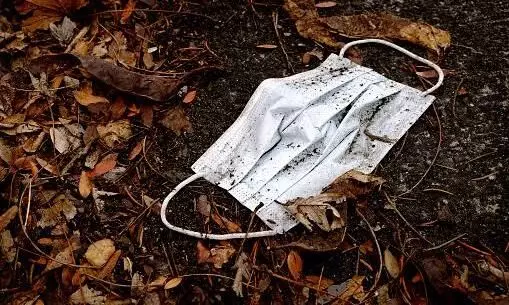
Plastic Pollution: Face masks, another burden on earth
text_fieldsAccording to a report released by the marine conservation organization OceansAsia, 1.56 billion face masks are estimated to have entered our oceans in 2020 which amounts to between 4,680 and 6,240 metric tonnes of plastic pollution.
According to the report titled 'The impact of Covid-19 on marine plastic pollution', about three per cent of the total produced face masks enter the oceans.
The use of face masks has become an essential and common tool in preventing the spread of the Covid-19 virus in the ongoing pandemic. Though there are many types of masks available in the market, 90 per cent of the public wears disposable face masks that need to be changed every 5-6 hours. These masks include three layers of plastic including polypropene, a strip of metal to grip around the nose and ear loops.
The composition of disposable or single-use face masks coupled with their risk of contamination and infection makes it difficult to recycle. Disposable face masks are made from a variety of melt-blown plastics and enter the ocean when carelessly littered or discarded. Inadequate or non-existent waste management system and an increased volume of waste overwhelming the waste management system also contribute to the improper disposal of masks.
Plastic in the marine environment can have detrimental impacts on wildlife and ecosystems. The various plastics break down extremely slowly into micro-plastics which then filter into marine food chains with disastrous consequences. These microplastics could take around 450 years to fully decompose.
The ear loops of the masks also have possible entanglement risks for wildlife. Many cases of gulls and fished being entangled in the ear loops of the discarded mask have already been reported across the world.
Wild and marine life are also mistaking the mask to be food and consuming it. Instituto Argonauta, a Brazilian marine conservation organization reported finding a Megellanic penguin with an N95 mask in its stomach on Juquehy Beach in Sao Paulo. The macaques in Malayasia have also been spotted chewing these masks.
Conservationists are raising the importance of encouraging people to wear reusable masks whenever possible and of the proper way of recycling used masks.
Instead of making masks with multiple materials, experts are asking the masks to be made using polymers alone since it makes the recycling process much easier. While discarding the masks, cutting off the ear loops will help prevent entanglement risks for animals.
Using reusable and biodegradable masks is also an important solution to prevent ocean pollution. When choosing reusable cloth masks, people should follow government recommendations concerning the design, materials used, and the fit of their masks.























